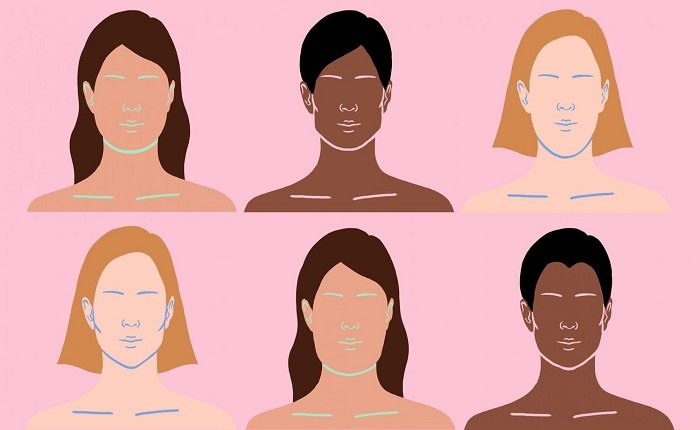How to Effectively Check My Face: Tips for Skin Care and Personal Grooming

Checking your face regularly is an essential part of maintaining good skin care and personal grooming habits. By taking a few minutes each day to observe your skin, you can catch problems early, such as dryness, acne, or wrinkles, and take proactive steps to address them. Understanding your skin type, identifying any issues, and treating them effectively can help you achieve clear and healthy skin.
When you ask yourself, “How do I check my face?” the answer lies in knowing how to inspect it for changes, paying attention to any discomfort, and using the right tools to monitor its condition. In this blog post, we’ll explore practical tips for checking your face and caring for your skin in the best possible way.
How to Check My Face for Acne Breakouts
Acne is one of the most common skin issues people face, and knowing how to check your face for breakouts is essential in addressing it early. To do this, start by thoroughly cleansing your face and examining it under a bright light. Check for redness, bumps, and inflammation, which are signs of acne.
If you find a pimple, avoid picking at it. Instead, use gentle acne treatments like salicylic acid or benzoyl peroxide. These treatments can help reduce swelling and prevent further breakouts. Additionally, if you regularly check your face for acne, you’ll be able to identify any changes in your skin over time, allowing you to adjust your skincare routine accordingly.
Check My Face for Dryness and Dehydration
Dry skin is another issue to look out for when checking your face. To spot signs of dehydration or dryness, feel your skin after washing it. If your face feels tight or flaky, it’s likely that you’re dealing with dryness. Dryness can occur due to various factors, such as weather changes, harsh skincare products, or inadequate hydration.
To combat this, apply a good moisturizer and drink plenty of water throughout the day. If you have severely dry skin, consider switching to a hydrating face mask or using products containing hyaluronic acid. Regularly checking your face for dryness helps prevent long-term skin damage and keeps your complexion soft and smooth.
How to Check My Face for Signs of Aging
As we age, our skin naturally loses elasticity and may begin to develop fine lines, wrinkles, and age spots. It’s important to check your face for these signs as early as possible so you can take preventive measures. Pay special attention to areas like your forehead, under the eyes, and around the mouth, where wrinkles typically form first.
If you notice any fine lines or crow’s feet, consider using anti-aging products such as retinoids or peptides. Protecting your skin with SPF daily will also prevent further damage from the sun, which can accelerate the aging process. Regularly checking your face for aging signs can help you manage these changes and slow down the aging process effectively.
How to Check My Face for Skin Irritation
Skin irritation can occur due to a variety of reasons, such as allergic reactions, harsh weather, or the use of new skincare products. When checking your face, look out for redness, swelling, or a burning sensation. If your skin is irritated, try to identify the product or environmental factor causing the issue.
To soothe irritated skin, apply calming ingredients like aloe vera or chamomile. Additionally, avoiding products with alcohol or fragrances can help reduce irritation. Checking your face for skin irritation allows you to act quickly before the irritation worsens, providing relief and restoring balance to your skin.
Check My Face for Oily Skin and Large Pores
Oily skin is a common concern for many people, especially those with an overactive sebaceous gland. Checking your face for excessive oil production involves examining areas like your forehead, nose, and chin—often referred to as the T-zone. These areas tend to be more prone to oiliness and can lead to clogged pores and acne if not properly cared for.
If you have oily skin, consider using oil-free moisturizers and gentle cleansers designed for oily skin types. Regularly exfoliating can also help reduce pore size and control excess oil. By frequently check my face for oiliness, you can maintain a balanced skin tone and avoid breakouts.
How to Check My Face for Hyperpigmentation
Hyperpigmentation refers to dark spots or uneven skin tone caused by sun exposure, acne scarring, or other factors. Checking your face for signs of hyperpigmentation can help you determine if you need to take action with brightening treatments. Look for any areas of your skin that appear darker than the rest, especially on your cheeks, forehead, or chin.
To address hyperpigmentation, use products containing vitamin C or niacinamide, which can help lighten dark spots over time. Consistent use of sunscreen is also essential to prevent further pigmentation. Regularly check my face for hyperpigmentation enables you to create an effective treatment plan and maintain even, radiant skin.
How to Check My Face for Healthy Glow
A healthy, glowing complexion is often a sign of well-hydrated and well-maintained skin. To check your face for a healthy glow, focus on the overall appearance of your skin. Healthy skin should look plump, smooth, and radiant. If your face appears dull, it may be a sign that you need to exfoliate or use hydrating products.
Consider incorporating a facial oil or serum into your routine to boost your skin’s radiance. Additionally, maintaining a healthy diet and staying hydrated can support the natural glow of your skin. By check my face regularly, you can identify when your skin needs a little extra care to keep it glowing.
Conclusion
Incorporating a habit of regularly checking your face is essential for maintaining healthy skin and addressing any issues early on. Whether you’re looking for acne breakouts, dryness, signs of aging, or oiliness, inspecting your face regularly will allow you to take control of your skin’s health. With the right skincare routine and habits, you can achieve a clear, glowing complexion and feel confident in your skin. Remember, consistency is key when it comes to skincare, so take a few minutes each day to check your face and adjust your routine as needed. Your skin will thank you!




